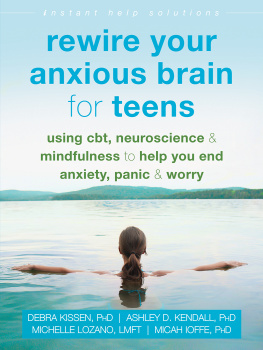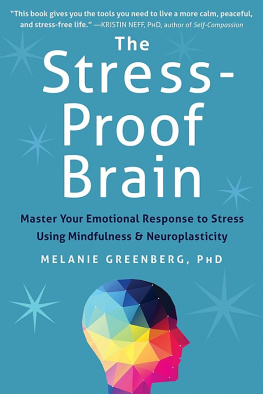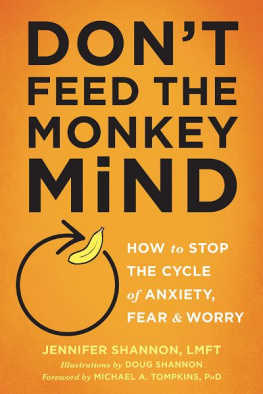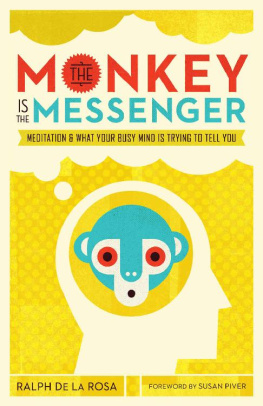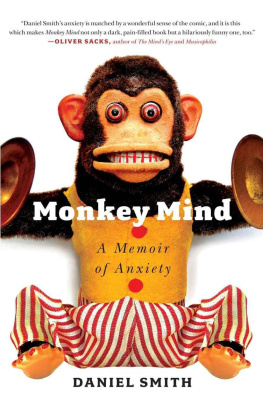Mindfulness
Taming the Monkey Mind
A Beginner's Guide to Use Mindfulness, Meditation,
and Breathing to Calm Your Brain
By Mitchell Wagner
Legal Notice:
This eBook is copyright protected. This is only for personal use. You cannot amend, distribute, sell, use, quote, or paraphrase any part or the content within this eBook without the consent of the author or copyright owner. Legal action will be pursued if this is breached.
Disclaimer Notice:
Please note the information contained within this document is for educational purposes only.
Every attempt has been made to provide accurate, up-to-date and reliable, complete information. No warranties of any kind are expressed or implied. Readers acknowledge that the author is not engaging in rendering legal, financial, or professional advice.
By reading any document, the reader agrees that under no circumstances are we responsible for any losses, direct or indirect, that are incurred as a result of use of the information contained within this document, including, but not limited to, errors, omissions, or inaccuracies.
Table of Contents
Do you sometimes feel as if your brain is out of control? Do you wake up every day with your mind already racing, thinking of all the things you need to accomplish? Throughout the day, are you pulled in a hundred different directions at once? Lying in bed at night, do you replay the day's events, fretting over the things you should or should not have said or done? If this sounds familiar, you are not alone.
This common affliction is sometimes referred to as monkey mind. It is not that your brain is like a monkeys brain, but rather, that it is like a monkey, running to and fro, swinging from tree to tree, and never staying in one place for long. With this mindset, your brain never has a chance to rest, and your enemies want to keep it that way.
Knowing the Enemies: Stress, Anxiety, and Regret
When it comes to having a calm and focused mind, you have three common enemies: stress, anxiety, and regret. These are the things that keep your brain racing from one thought to the next. They prevent you from enjoying the things that are right in front of you.
Stress
Biologically speaking, stress is your bodys response to fear. Whether the fear is warranted or not, your body reacts when you feel overwhelmed or unprepared, triggering a specific stress response. This will be discussed more in the first chapter, but for now, what you need to know is that stress restricts your capacity to function. It makes it difficult for your brain to focus on anything except the fear you are feeling.
Anxiety
Anxiety is the emotion you experience when you worry about the future. It prevents you from experiencing and enjoying the things in your present life because you are rehearsing negative emotions that you might need tomorrow, next week, or next year. It is not possible for the mind to be open to the opportunities of the present when it is consumed by anxiety.
Regret
Regret is anxietys mirror image. Instead of urging your brain to focus on what might happen in the future, it convinces you to waste time reliving things that happened in the past. It is a wasteful emotion that keeps you fretting over things you can no longer change because they are already over.
These three negative emotions stress, anxiety, and regret are the enemies of peace, tranquility, and focus. They are diametrically opposed to the one thing that can help tame your monkey brain: mindfulness.
The purpose of this book is to help you understand mindfulness and how it can help you minimize the impact of negative emotions and get you back to a healthy mind. This begins with living in the present.
What You Will Learn in This Book
If you want to tame your monkey mind, you must understand how your brain works. The first chapter provides a brief overview of the human brain and explains how stress hijacks your brain. Most people are unaware of the many ways stress affects their bodies.
The second chapter will address the topic of mindfulness and how it can help tame your brain. Mindfulness is a word that a lot of people use without truly understanding it. Here, you will find a clear and simple definition, and then run through some examples of mindfulness practices that will help you grasp the concept.
In the third chapter, you will be provided with an easy mindfulness plan to follow for three weeks; research tells us that it takes 21 days to ingrain a habit. By the end of that time, you will have made mindfulness a part of your daily life. It will be a habit that can help vanquish the negative emotions that prevent a healthy mindset.
Finally, the fourth chapter will give you some practical guidelines about how to incorporate the practices you have learned into your everyday life.
Mindfulness is a gift to yourself that can help you be a better friend, parent, and worker.
Lets get started.
To understand why mindfulness is the antidote for negative emotions causing stress, you first need to know something about your mind and how it works. The human brain has evolved over time, and the way it has evolved can tell us a lot about why stress is so harmful.
A Brief History of the Brain
If you are like most people, you think of your brain as a single organ. Although that perception is true to a point, it is also a bit misleading. The human brain has distinct areas that function in different ways. One explanation of those functions refers to the brain as being triune, meaning that it is composed of three parts.
1. The basal ganglia, also known as the Reptilian Brain, is the most primitive part of your brain, and is the home of the fight or flight response. This response is at the heart of your bodys response to danger. Your Reptilian Brain is active when fear is present and takes precedence over everything else in your body. It calls all of the shots, and until its fears are assuaged, it will be very difficult for your brain to learn, think, or function in a rational way.
2. The middle, or Mammalian Brain, is driven by emotion. It is more evolved than the Reptilian Brain, but still not capable of logic. It can be easily distracted by negative emotions.
3. The neocortex, also known as the New Brain, is the most highly evolved part of the brain and is responsible for your ability to rationalize and apply logic to situations. This part of the brain can function properly only when the basal ganglia and middle brains are calm and satisfied.
The Fight-or-Flight Response and How It Hijacks Our Lives
Now that you understand the basic structure of the triune brain, lets go into some more detail about the fight-or-flight response and what it does to you when you experience it.
The fight-or-flight response is a defense system in your body. When you encounter a situation that threatens your life or safety, it triggers a particular biochemical response that helps your body prepare to do one of two things:
1. Battle the danger (Fight); or
2. Run from the danger (Flight.)
What does that mean in biological terms? First, it means that your body releases two important hormones, adrenaline and cortisol. You are probably familiar with the effects of adrenaline. It increases the flow of oxygen to your muscles, and it makes you feel wide awake. Your heartbeat speeds up, as does your breathing. It takes energy away from certain bodily functions, such as digestion, and makes the energy available to you so you can use it for other things, such as running. It sharpens your senses and can even make it seem as though time is slowing down.




